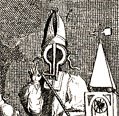 We like to refer to the mind as a computer or a steel trap or--when we're feeling forgetful--a sieve. But it was not always so.
We like to refer to the mind as a computer or a steel trap or--when we're feeling forgetful--a sieve. But it was not always so.Brad Pasanek, of the Annenberg Center for Communication (University of Southern California), has put together The Mind is a Metaphor: A Database of Eighteenth-Century Metaphors of Mind. The database is "a scholarly study of the metaphors and root-images appealed to by the novelists, poets, dramatists, essayists, philosophers, belle lettrists, preachers, and pamphleteers of the eighteenth century."
Pasanek divides his work into entries which categorize the metaphors according to "fancy's coinage, reason's empire, the court of conscience, strangers within, the mind's eye, a soldier's 'mettle' or 'metal,' and so forth." He reports that "even the most unlikely metaphors have careers: the mind is once likened to meat rotating on a smoke-jack in the Memoirs of Martinus Scriblerus and then again in Tristram Shandy."
In An Essay Concerning Human Understanding, John Locke said that the Understanding "searches after Truth, are a sort of Hawking and Hunting, wherein the very pursuit makes a great part of the Pleasure."
G. W. Leibniz invited the readers of The Principles of Philosophy, or, the Monadology to imagine a "machine whose structure makes it think, sense, and have perceptions" enlarged to the size of a mill, upon "inspecting its interior, we will only find parts that push one another, and we will never find anything to explain a perception."






 ms.dsk is reading
ms.dsk is reading  Rob Koelling is reading
Rob Koelling is reading  S. Renee Dechert is reading
S. Renee Dechert is reading  Mary Ellen Ibarra-Robinson is reading
Mary Ellen Ibarra-Robinson is reading  Bill Hoagland is reading
Bill Hoagland is reading  Jennifer Sheridan is reading
Jennifer Sheridan is reading  Robyn Glasscock is reading poetry by
Robyn Glasscock is reading poetry by  Susan Watkins is reading
Susan Watkins is reading
No comments:
Post a Comment